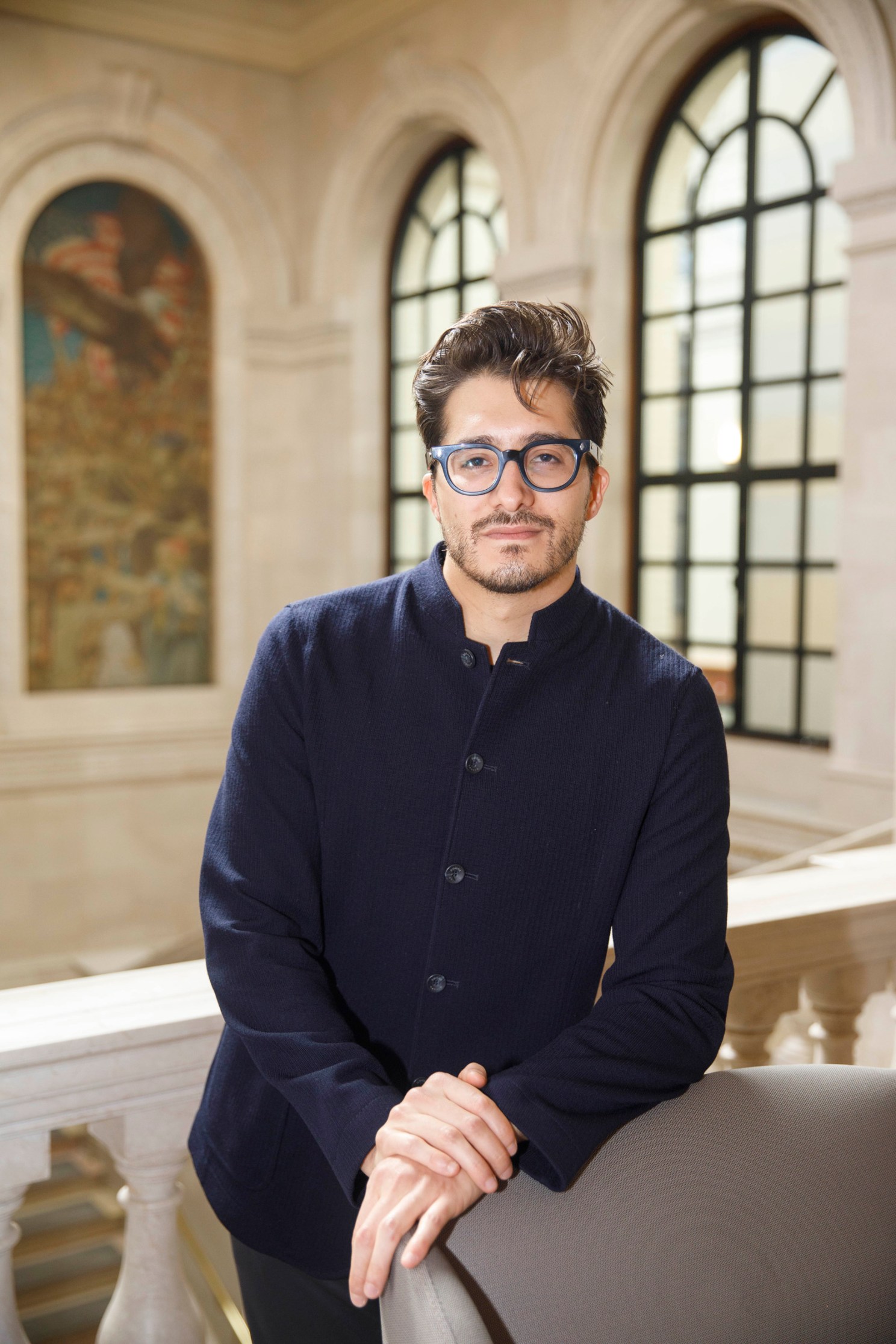
Mauro Lazarovich.
Kris Snibbe/Harvard Staff Photographer
Studying Latin American literature of stateless amid new era of displacement
Harvard Horizons Scholar to detail research at Sanders symposium
Mauro Lazarovich was preparing for a trip abroad when he picked up a copy of “Trieste and the Meaning of Nowhere.”
In her travelogue, Jan Morris refers to the people of Trieste as “citizens of nowhere.” That struck a chord with Lazarovich, whose grandfather was born in the Italian port city, situated on the easternmost border next to Slovenia and once part of the Austro-Hungarian Empire. Lazarovich’s grandfather subsequently emigrated to Argentina, where Lazarovich was born and raised.
The Ph.D. candidate studying Romance languages and literatures decided to title his dissertation “Citizen of Nowhere: Stateless and Refugee Literature in Latin America.” In December, the work earned him a spot in the 2024 cohort of Harvard Horizons Scholars, an initiative to highlight the scholarship of students in the Kenneth C. Griffin Graduate School of Arts and Sciences.
“I found the title of my dissertation, right there in a book about the place where my grandfather, whom I never met, came from,” Lazarovich said.
“I found the title of my dissertation, right there in a book about the place where my grandfather, whom I never met, came from.”
Harvard Horizons is awarded annually to eight Ph.D. candidates. Besides spotlighting outstanding scholarship, the honor helps students hone presentation skills. This year’s winners will get training in how to make their work accessible for a general audience and tips on effective delivery ahead of a campus-wide symposium at Sanders Theatre in April.
“Harvard Horizons is a good platform to show that literature and the humanities have a lot to bring to the table when talking about the refugee problem,” Lazarovich said. “The writers and artists I study were faced with the challenge of using their writing and their art to witness and convey the situation of refugees around the world. Their works articulate different answers on how to respond to the ethical demand posited by the refugees. To think about their answers puts us, readers, in the position of having to articulate our own ethical responsibilities.”
While Lazarovich’s work now focuses on Latin America, he was first inspired to write his dissertation after studying the work of Stefan Zweig. The Jewish émigré author was raised in early 20th-century Vienna and traveled throughout Europe before fleeing to England and later Brazil during the Nazi takeover. Zweig’s transition from what Lazarovich called “citizen of the world to citizen of nowhere” and his work mourning previously held notions of Europe sparked Lazarovich’s interest in migrant, stateless, and refugee literature.
“For Arendt, once stateless people lose their citizenship, they experienced what she called ‘the abstract nakedness of being human and nothing but human.’”
Lazarovich also drew inspiration from Hannah Arendt, the German philosopher who was forced to flee Germany in 1933 when Hitler became chancellor. Arendt’s first major work, “The Origins of Totalitarianism” (1951), analyzed the rise of Nazism and Stalinism in the early 20th century and detailed what she called the “paradox of human rights.”
“For Arendt, once stateless people lose their citizenship, they experienced what she called ‘the abstract nakedness of being human and nothing but human.’ This was, for her, a condition of radical vulnerability that couldn’t guarantee them asylum or human rights anywhere,” Lazarovich said.
His research eventually led him to fiction, poetry, essays, and artwork in which Latin American artists, writers, and intellectuals such as Gabriela Mistral, João Guimarães Rosa, Pablo Neruda, and Lasar Segall address the refugee crisis following World War II. Mistral’s poetry, which Lazarovich initially viewed as somewhat naïve, proved especially surprising. The Nobel laureate represented her home country of Chile in various overseas posts and often wrote about refugees.
“As a diplomat, Mistral couldn’t question the state’s migratory policy of the time. For example, in some of her writings, she talks about how she was forced to reject visa applications from Spaniards who wanted to emigrate to Chile,” Lazarovich said. “But, as a poet and as an intellectual, she wrote about the plight of the refugees in poems such as ‘La huella’ [or ‘The Footprint’], one of the works that I analyze. She promoted a discourse of hospitality, and even conceived of new rights of asylum for the refugees during the post-war era.”
Lazarovich believes that his research has particular resonance in the 21st century, with migrant and humanitarian crises mounting across the world. “According to the United Nations High Commissioner for Refugees, in 2016 the number of displaced people worldwide surpassed that of World War II,” he said. “The goal of my work is to reveal how Latin American writers and artists have used their works — that is, poetic, literary and artistic language — in the past and today, to respond to the refugee problem.”




